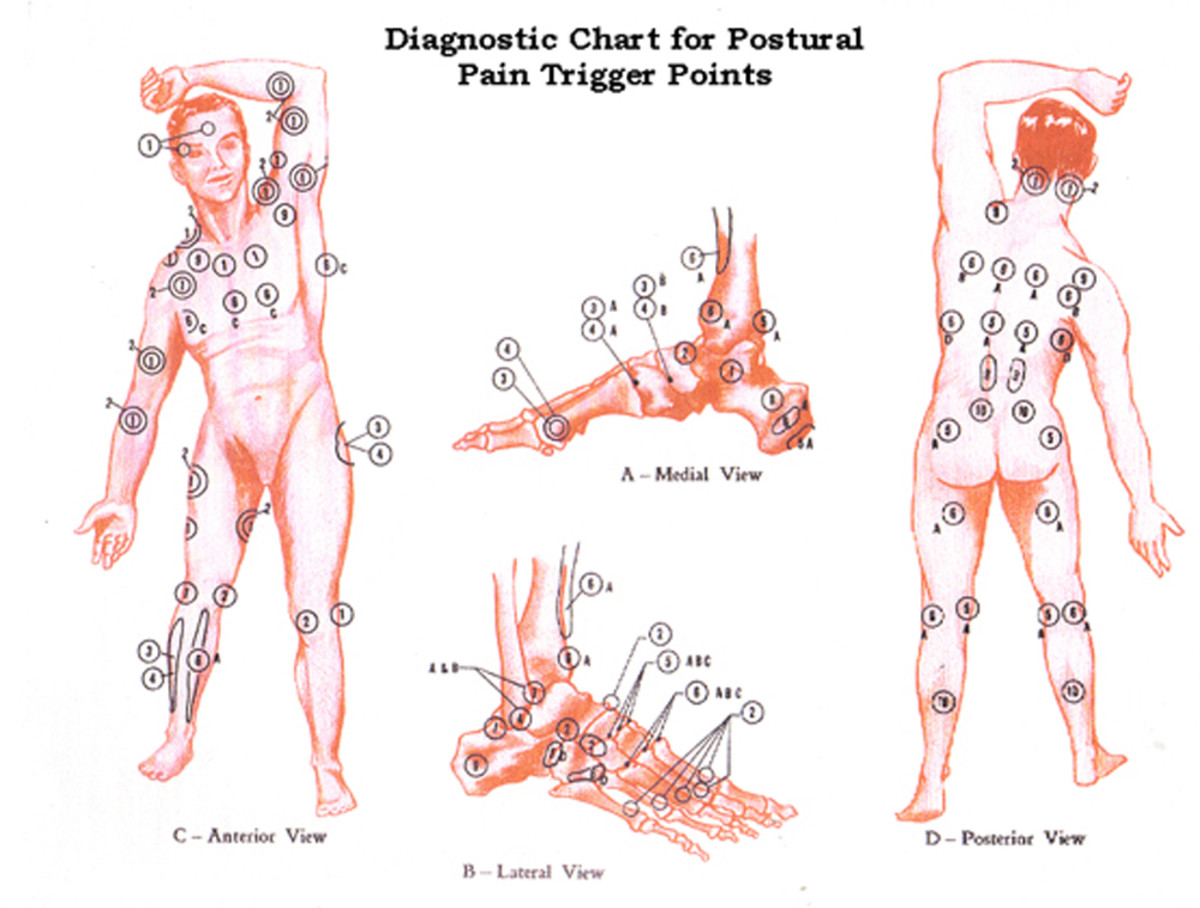How to tell if you have Fibromyalgia?

Do you experience any of the following symptoms on a regular basis?
- Chronic muscle pain, muscle spasms or tightness, weakness in the limbs, and leg cramps
- Moderate or severe fatigue and decreased energy
- Insomnia or waking up feeling just as tired as when you went to sleep
- Stiffness upon waking or after staying in one position for too long
- Difficulty remembering, concentrating, and performing simple mental tasks
- Abdominal pain, bloating, nausea, and constipation alternating with diarrhea (irritable bowel syndrome)
- Tension or migraine headaches
- Jaw and facial tenderness
- Sensitivity to one or more of the following: odors, noise, bright lights, medications, certain foods, and cold
- Feeling anxious or depressed
- Numbness or tingling in the face, arms, hands, legs, or feet
- Increase in urinary urgency or frequency (irritable bladder)
- Reduced tolerance for exercise and muscle pain after exercise
- A feeling of swelling (without actual swelling) in the hands and feet
- Painful menstrual periods
- Dizziness
If you are experiencing many of the above list with no obvious medically diagnosed explanation for them you could be suffering from fibromyalgia.
Fibromyalgia, also known as fibromyalgia syndrome, fibromyositis and fibrositis, is frequently misdiagnosed in spite of being the most common arthritis related condition after osteoarthritis. Fibromyalgia causes the body to ache all over and additionally can cause chronic fatigue, restless sleep, depression, irritable bowel syndrome and painful period cramps, as well as many other symptoms. Roughly one quarter of fibromyalgia sufferers are unable to continue working.
Unfortunately it takes an average of five years for a patient suffering from fibromyalgia to be correctly diagnosed, which means five years of discomfort, (plus numerous medical tests) without finding out the real cause. Many of the common symptoms of fibromyalgia are similar to those of other conditions, leading to Doctors to misdiagnose the problem.
To eventually be correctly diagnosed the patient needs to exhibit widespread pain in all four quadrants of the body for a minimum of three months and tenderness or pain in at least 11 of the 18 specified tender points when pressure is applied. (see diagram right).
"Fibromyalgia is one of the most common chronic pain conditions. The disorder affects an estimated 10 million people in the U.S. and an estimated 3-6% of the world population. While it is most prevalent in women —75-90 percent of the people who have FM are women —it also occurs in men and children of all ethnic groups. The disorder is often seen in families, among siblings or mothers and their children. The diagnosis is usually made between the ages of 20 to 50 years, but the incidence rises with age so that by age 80, approximately 8% of adults meet the American College of Rheumatology classification of fibromyalgia."
(Quoted from http://www.fmaware.org )
People with rheumatoid arthritis and other autoimmune diseases are particularly likely to develop fibromyalgia.
Treatment
So let's assume that after years of pain, sleepless nights, twitching limbs, a 'woolly' mind (especially in the mornings), irritable bowel syndrome, etc etc, you have finally been told by your Doctor that he believes you may have fibromyalgia.
'Great' you think, 'now I can finally get the correct treatment and start living my life normally again'.
Sorry, Wrong!
The problem with fibromyalgia is that it is very hard to treat, not least of which because the aches and pains that the body appears to be suffering from are largely caused by the malfunctions of the nervous system in the way it processes information. There are medications that may help to alleviate the symptoms to a degree, but there is no actual cure for the condition, (as of January 2010).
Medications that are showing promise include:
Pregabalin (Lyrica).This is the first medication, which has received FDA approval specifically for Fibromyalgia.
Duloxetine (Cymbalta). This was the second medication to be approved.
Milnacipran (Savella). This was the third medication to be approved.
Other FM medications are currently being developed, and may soon receive FDA approval to treat fibromyalgia.
*****
*****
Other Medications that can help with specific symptoms include:
Amitriptyline/Elavil. Most tested agent in FM. Helpful for Mild Pain and sleep.
Clonazepam/Klonopin, Clonapam. Useful for Anxiety, Restless leg syndrome and sleep.
Dicyclomine hydrochloride/Bentyl. Beneficial for Irritable bowel syndrome/pain.
Duloxetine hydrochloride/ Cymbalta. Good for depression, sleep and pain.
Growth Hormone (e.g., Nutropin). Helpful for Depression, fatigue, pain and quality of life.
Zonisamide/Zonegran. Useful for Neuropathic pain.
There are many more drugs that can assist in the specific symptoms associated with fibromyalgia, and I recommend this site for further examples of these drugs.
Yes, fibromyalgia can be managed to a degree, but it needs to be treated differently than a standard disease. Remember, it is a syndrome, not a disease.
Specified Tender Points

Other Beneficial Lifestyle Changes.
Sleep. Try to keep to a regular sleep schedule, going to bed and getting up at the same times each day. Ensure your bed is comfortable and your room is warm, free from such distractions as noise, telephones, televisions etc. Avoid stimulants before bed such as caffeine, alcohol and sugar. Don't eat immediately prior to attempting to sleep and try relaxation exercises such as meditation to aid good quality sleep.
Other Options. Try taking up yoga or joining a fibromyalgia support group. Acupuncture can help, aromatherapy, massage and water therapy can also be beneficial. There are many other alternative treatments you might want to consider that are easily found if you research the Internet on the subject.
Long Term Prognosis
Right now there is no overall cure for fibromyalgia, but the medications that are available to control the individual symptoms are getting better and better. Specific medications to treat fibromyalgia are in development and research papers being written have increased dramatically since 1990.
Additional Research Sources Used
- UK Fibromyalgia: Absolutely everything you need to know about fibromyalgia.
The independent voice of UK Fibromyalgia. Absolutely everything you need to know about Fibromyalgia, FaMily Magazine, FM Forum, ask the doctor, exercise, legal , research, benefit claims, medication - What Is Fibromyalgia?
WebMD provides an overview of fibromyalgia, including information on symptoms, diagnosis, standard and alternative treatments, and medications. - http://www.fmaware.org








